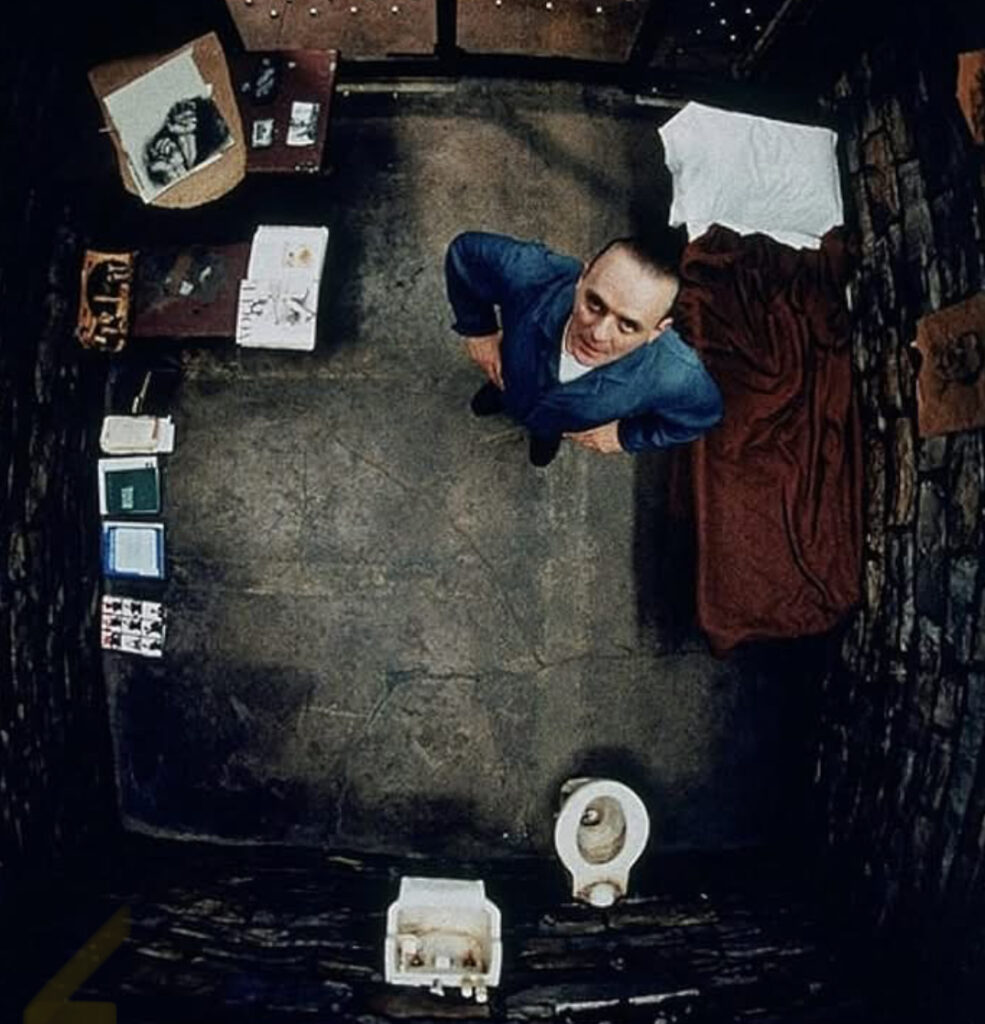The Silence of the Lambs (1991) is widely regarded as one of the greatest psychological horror-thrillers ever made. Directed by Jonathan Demme and based on the 1988 novel by Thomas Harris, the film masterfully blends elements of horror, suspense, and psychological drama. It features Jodie Foster as Clarice Starling, an ambitious yet vulnerable FBI trainee, and Anthony Hopkins as Dr. Hannibal Lecter, the charismatic yet terrifying cannibalistic psychiatrist.
Upon its release, the film received both critical and commercial acclaim, becoming only the third film in history to win the “Big Five” Academy Awards: Best Picture, Best Director, Best Actor, Best Actress, and Best Adapted Screenplay. Over three decades later, it remains a cultural phenomenon, with its influence spanning across film, television, and pop culture.
Plot Summary
A Case That Pushes the Boundaries of Fear
The story follows Clarice Starling, an intelligent yet inexperienced FBI trainee assigned to interview Dr. Hannibal Lecter, a former psychiatrist and convicted cannibalistic serial killer. Her mission? To gain insight into the mind of Buffalo Bill, a sadistic serial killer who abducts and murders women, skinning their bodies in a twisted ritual.
As Starling attempts to extract useful information from Lecter, she becomes entangled in his psychological games. Lecter, fascinated by her determination and haunted past, offers cryptic clues that eventually lead Starling closer to Buffalo Bill. However, his help comes at a cost—Starling must reveal her own deepest fears and traumatic childhood memories.
As the investigation intensifies, time runs out for Buffalo Bill’s latest captive, Catherine Martin, the daughter of a U.S. senator. Starling follows the clues Lecter provided, eventually tracking down the killer and confronting him in a heart-pounding climax.
Character Analysis
Clarice Starling (Jodie Foster): A Woman in a Man’s World
Clarice Starling is a remarkable protagonist. Unlike traditional male-dominated crime thrillers, The Silence of the Lambs centers on a strong yet vulnerable female lead who battles not just a serial killer but also the sexism and condescension of her male peers.
•Intelligence & Determination: Starling is a gifted investigator, able to analyze evidence and make connections others might overlook.
•Vulnerability & Strength: She is haunted by childhood trauma, particularly memories of lambs being slaughtered—an allegory for her own helplessness and drive to save innocent lives.
•Relationship with Lecter: Their interactions form the psychological core of the film. Unlike other characters who see Lecter as a monster, Starling treats him with respect, and in return, he provides her with valuable insights.
Dr. Hannibal Lecter (Anthony Hopkins): The Ultimate Cinematic Villain
Anthony Hopkins’ Hannibal Lecter is often cited as one of the greatest villains in film history. Unlike typical horror antagonists, Lecter is intellectually superior, eerily composed, and deeply manipulative.
•Mind Games & Psychological Dominance: Lecter enjoys dismantling people’s minds, analyzing their weaknesses, and exploiting them. His conversations with Starling serve as a chilling game of cat and mouse.
•Chilling Presence: Hopkins’ performance, particularly his calm yet unsettling voice and piercing gaze, makes Lecter terrifying even when he is physically restrained.
•Moral Complexity: Despite his gruesome crimes, Lecter is not entirely without honor. He respects Starling, despises Buffalo Bill, and punishes those he deems rude or unworthy.
Buffalo Bill (Ted Levine): A Disturbing Portrait of Evil
Unlike Lecter’s refined and calculated menace, Buffalo Bill (Jame Gumb) is a far more chaotic and disturbing killer.
•Motive: He seeks transformation, attempting to create a “woman suit” from the skin of his victims. His crimes are rooted in his extreme psychological instability and identity crisis.
•Iconic Scene: His eerie performance of “Goodbye Horses” while dancing in front of a mirror is one of the most disturbing moments in cinematic history.
•Contrast with Lecter: While Lecter is coldly methodical, Buffalo Bill is sloppy, impulsive, and animalistic—emphasizing the film’s duality of horror.
Themes & Symbolism
The Power of Fear & Psychological Horror
Unlike typical horror films that rely on gore or supernatural elements, The Silence of the Lambs induces terror through psychological depth. The fear comes not just from killers but from the unknown, from powerlessness, and from Starling’s own trauma.
Gender & Power Dynamics
The film subtly critiques gender roles in law enforcement and society. Starling, often the only woman in a room full of men, must constantly prove her worth. Meanwhile, Buffalo Bill’s crimes revolve around gender identity and transformation.
The Meaning of the Lambs
The title’s reference to “silence of the lambs” is deeply symbolic:
•The lambs represent innocence and helplessness—a reflection of Starling’s own past.
•Starling’s quest to stop Buffalo Bill is, in a way, her attempt to silence the “crying lambs” of her childhood.
Cinematography & Direction
Jonathan Demme’s direction and Tak Fujimoto’s cinematography elevate the film to an artistic masterpiece.
•Close-Up Shots: The frequent use of extreme close-ups intensifies the psychological tension, making interactions between Starling and Lecter feel uncomfortably intimate.
•Lighting & Atmosphere: The dark, shadowy cinematography in scenes such as Lecter’s prison cell or Buffalo Bill’s lair enhances the horror elements.
•Pacing & Suspense: The film builds tension masterfully, culminating in the final showdown between Starling and Buffalo Bill in complete darkness.
Impression & Legacy
•Oscar Wins & Critical Acclaim: The film’s sweeping of the Academy Awards’ “Big Five” categories cemented its place in history.
•Pop Culture Influence: Lines like “It rubs the lotion on its skin” and Lecter’s famous “fava beans and a nice Chianti” speech have become legendary.
•Influence on Crime Thrillers: The Silence of the Lambs paved the way for modern psychological thrillers and crime dramas, inspiring films like Se7en (1995) and TV series like Hannibal (2013).
Impression
The Silence of the Lambs is far more than just a horror film. It is a masterful exploration of psychology, fear, power, and transformation. With unforgettable performances, a gripping narrative, and a lasting cultural impact, it remains one of the most intelligent and terrifying films ever made.
Even today, its themes resonate, and Hannibal Lecter remains one of the most chilling villains in cinematic history. The question remains: Is Starling truly free from the screams of the lambs, or do they still haunt her?
No comments yet.







